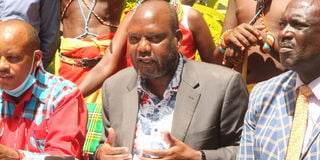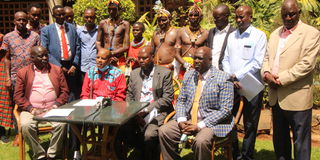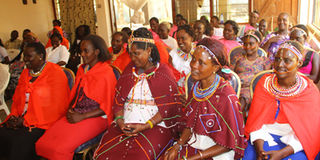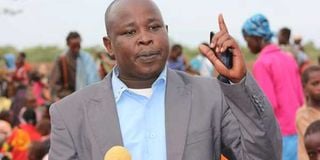Baringo minority groups want seats to be reserved for them

Former IEBC commissioner Thomas Letangule (centre) speaking on behalf of the Ilchamus community leaders in Nakuru on December 7, 2020.
Minority and marginalised communities in Baringo County are pushing for affirmative action in leadership positions ahead of the August General Election to ensure fair representation in decision-making.
The call came as communities across counties negotiate power-sharing deals in efforts to ensure balance.
In Baringo, the Pokot and Ilchamus communities have over the years complained about being sidelined by the dominant Tugen in leadership. They argue that this keeps them out of crucial dockets and nominations.
Since the advent of devolution in 2013, all the major county seats, including governor, senator and woman representative, have gone to leaders from the Tugen community.
Although the Ilchamus in Baringo South have for years fielded a parliamentary candidate against Tugen contestants, none has ever sailed through.
Having missed out on elective posts several times, the community on the shores of Lake Baringo has been pushing for the creation of their own constituency so that they can agitate for their issues in Parliament, but these efforts have not succeeded.

Representatives of the Ilchamus community addressing journalists in Nakuru town on December 7, 2020. Phyllis Musasia | Nation Media Group
The Ilchamus also said they were locked out of nomination slots and the East African Legislative Assembly (EALA) in 2017.
“Due to their big numbers, we fear our Tugen brothers will continue to dominate us and we’ve no chance of ascending to any political leadership in the county as well,” said Amos Olempaka, who has twice unsuccessfully vied for the Baringo South parliamentary seat.
“Owing to our small numbers in Baringo County, we have no political representation, save for only two members of the county assembly.”
Former Independent Electoral and Boundaries Commission (IEBC) member Thomas Letangule lamented that the community has pushed for the creation of their own constituency over the years in vain.
The community complained that the views they presented to the IEBC on an Inchamus constituency during the last boundary review were not taken into account.

Women from the Ilchamus, Tugen and Pokot communities listen to a speaker at Marigat during a peace training seminar over the weekend. They appealed to President Kenyatta and Deputy President William Ruto to help end the cattle rustling menace. PHOTO | MAGDALENE WANJA | NATION MEDIA GROUP
They had also submitted the same proposal to the predecessor of the IEBC in 2010, to no avail.
IEBC records show that the Ilchamus community has more than 10,000 registered voters.
The Pokot community, which occupies Tiaty constituency, expresses similar complaints, and they are now pushing for the deputy governor and deputy Speaker posts.
A similar consensus worked in 2013, when the Pokot took the Speaker’s slot (held by William Kamket, now the Tiaty MP) as a way of accommodating all communities in the county leadership.
On Sunday, Baringo County Assembly Minority Leader Sam Lourien acknowledged that their small numbers do not allow them to bargain for deals for top positions like deputy governor and they will push for the deputy Speaker’s slot.
He said the dominant Tugen community enjoys the privilege of electing their own due to their numbers.
“There is nothing much we can do about it and what we are trying to do is to focus on years to come. We have set our agenda for the future and we shall vote for whoever we shall agree to vote for because our numbers at the moment are not enough,” Mr Lourien said.
He said their strategy is for their people to get national identity cards so that they can exercise their democratic rights in future elections.
Mr Lourien said their target is to have more than 70,000 registered voters by 2027, up from the current 28,916. That, they hope, will make them a swing vote in Baringo County.
“People seeking elective positions in future will have no option but to negotiate with us. It will be our time to decide for us. Whoever we will support, we will vote as a bloc. This is a message for the future that whoever wants to be elected must negotiate with us,” he said.
The only time someone from the Pokot community vied for a top elective seat in the county was in 2013, when former education official Susan Nakoru (Kanu) unsuccessfully contested the woman representative seat.
During a recent tour of the county by Deputy President William Ruto, the issue of representation came up, with the Ilchamus taking him to task on his agenda for minorities and marginalised groups.
In a memorandum presented to the DP, minority communities demanded representation in the county executive and National Assembly, and in appointments to senior government positions.

Human rights activist Amos Olempaka. He has called on police to produce Mukutani MCA Renson Kiole Parkei who was reportedly arrested over claims of inciting the Tugen and Ilchamus communities to violence. FILE PHOTO | CHEBOITE KIGEN | NATION MEDIA GROUP
Through their spokesperson, Mr Olempaka, they complained that their small numbers had not allowed them to elect one of their own to Parliament over the years. They appealed for direct nomination, claiming that they would give their more than three million votes to a candidate who addresses their issues.
“For several years, the minority and marginalised communities have not been able to elect their representative to Parliament. We are appealing (for their) inclusion … by direct nominations, and also (to) increase their participation in governance and decision-making to address the discrimination,” Mr Olempaka said.
In the memorandum, the group also urged the enactment of laws, regulations and policies that would require the county and national governments and government agencies to hire qualified members of these communities in all cadres.
“We are also calling for the establishment by the IEBC of special wards and constituencies for minority communities where appropriate and to revise the objectives of the equalisation fund that would target the group,” he added.
The DP promised that he would work to ensure that the minority communities are represented.
“Through the creation of an office of the minority communities, we now have data. I want to assure the group that through the Kenya Kwanza alliance, we will come up with a commission that will address all the issues in the Constitution that target them are implemented,” Dr Ruto promised.
“We are committing that we are going to escalate the department that is at the office of the Deputy President to a fully fledged commission on matters minorities so that their issues can be brought to the centre of government and stop living on the fringes of a society but incorporated properly in all the affairs of this country.”





